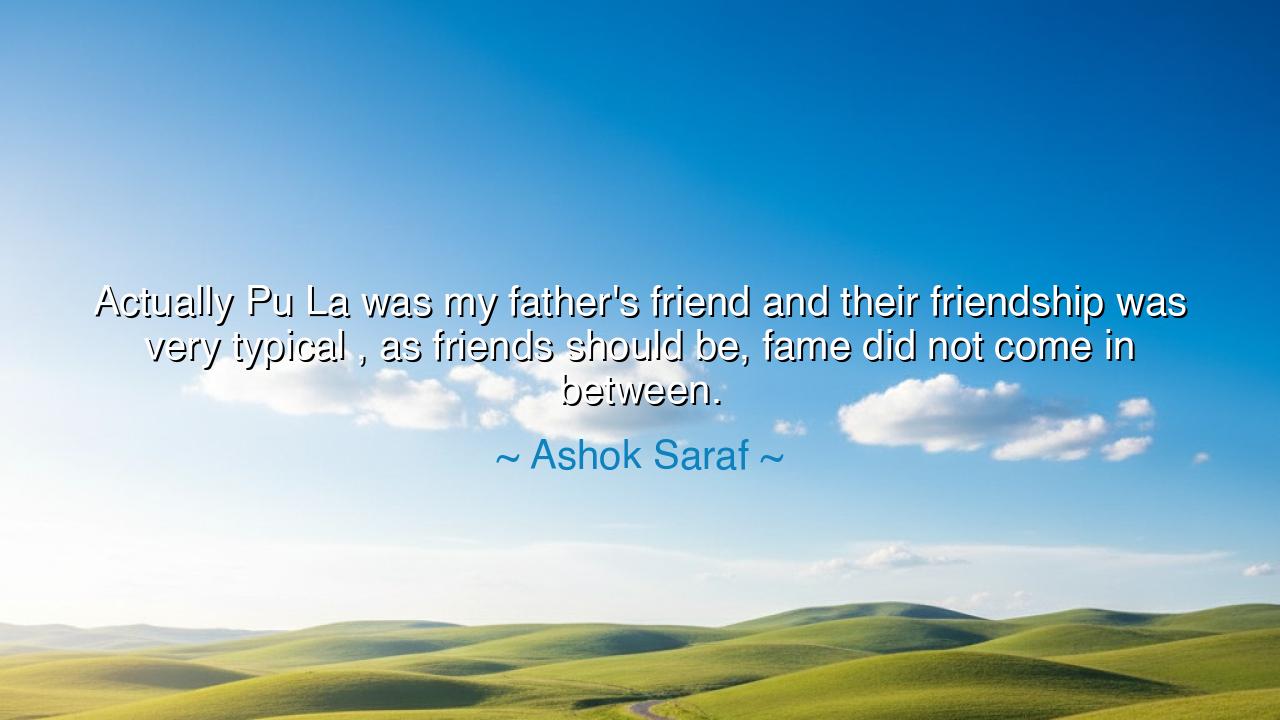
Actually Pu La was my father's friend and their friendship was
Actually Pu La was my father's friend and their friendship was very typical , as friends should be, fame did not come in between.






Hear the heartfelt words of Ashok Saraf, one of India’s most beloved actors, who said: “Actually Pu La was my father’s friend, and their friendship was very typical, as friends should be — fame did not come in between.” Though spoken with humility, these words carry the fragrance of timeless truth. They remind us that in an age where ambition often overshadows affection, the purest bonds are those untouched by pride. Through this reflection, Saraf pays tribute not only to Pu La Deshpande, the legendary Marathi writer and humorist, but also to a kind of friendship that the modern world too often forgets — one built on laughter, equality, and loyalty, not on status or power.
Pu La Deshpande, known affectionately as “Pu La,” was a man whose genius transcended art — a writer, musician, and philosopher whose works captured the spirit of Maharashtrian life with warmth and wit. Yet, despite his immense fame, Pu La was renowned for his humility. To hear Saraf describe his father’s friendship with Pu La as “typical” is not to diminish it, but to celebrate its simplicity — for the highest kind of friendship is ordinary in its honesty and extraordinary in its constancy. It needs no pedestal, no announcement, no pretense. It breathes easily in shared silence, endures through time, and remains untouched by the shifting winds of recognition.
This quote arises from the deep Indian tradition that honors friendship as sacred — not a convenience of circumstance, but a bond of souls. In ancient epics such as the Mahabharata, we see the divine friendship between Krishna and Arjuna, where the Lord himself became a charioteer to his friend, guiding him through despair and doubt. In that act of service, we see the same truth Saraf evokes — that in true friendship, no one is higher or lower, no one is famous or forgotten. Both stand equal in the eyes of the heart. The greatness of one does not overshadow the other; rather, it uplifts them both.
In the modern world, fame has become a fragile idol, demanding attention and separating people into illusions of importance. Yet Pu La’s friendship, as described by Ashok Saraf, shows that true affection is immune to such distortions. Imagine a celebrated artist sitting with his old friend, drinking tea, laughing about the past, unconcerned with applause or headlines. That simplicity — that refusal to let the world intrude — is a rare and sacred thing. It is a reminder that love and friendship are the only possessions we truly carry, even when fame fades and the lights dim.
We can find similar wisdom in the story of Abraham Lincoln and his lifelong friend Joshua Speed. When Lincoln, struggling with depression and political failure, found himself lost in darkness, it was Speed’s unwavering friendship that helped him endure. Years later, when Lincoln became president — one of the most powerful men in the world — he did not forget his friend. He wrote to him with the same affection, the same humility, never allowing status to poison the purity of their bond. Their friendship, like Pu La’s and Saraf’s father’s, teaches us that greatness lies not in rising above others, but in remembering who walked beside us when we were still unknown.
When Saraf calls their friendship “typical,” he speaks to a kind of normalcy that is now almost heroic — the idea that two souls can remain uncorrupted by difference. The essence of friendship is not grandeur, but balance. Friends mirror each other not in fame or wealth, but in laughter, in honesty, and in kindness. Theirs is a language beyond comparison. The wise have always known that to preserve such friendship, one must never let ego enter the sacred space between hearts.
The lesson here is both simple and eternal: cherish those who see you for who you are, not what you have become. Guard your friendships from the poison of envy and the illusion of fame. If fortune blesses you with success, let your heart remain humble enough to sit again with those who knew you before the world did. And if your friend rises higher than you, rejoice as if their triumph were your own. For as the ancients said, “A true friend’s glory is shared, not envied.”
So, dear listener, remember the wisdom hidden in Ashok Saraf’s quiet words: fame fades like the echo of applause, but friendship endures like the sound of the heart. Walk the path of life as Pu La did — brilliant yet humble, admired yet approachable, wise yet childlike in affection. And should fortune ever test your loyalty, let it be said of you, too, that your friendship was “typical” — in the most beautiful, human, and sacred sense of the word.






AAdministratorAdministrator
Welcome, honored guests. Please leave a comment, we will respond soon